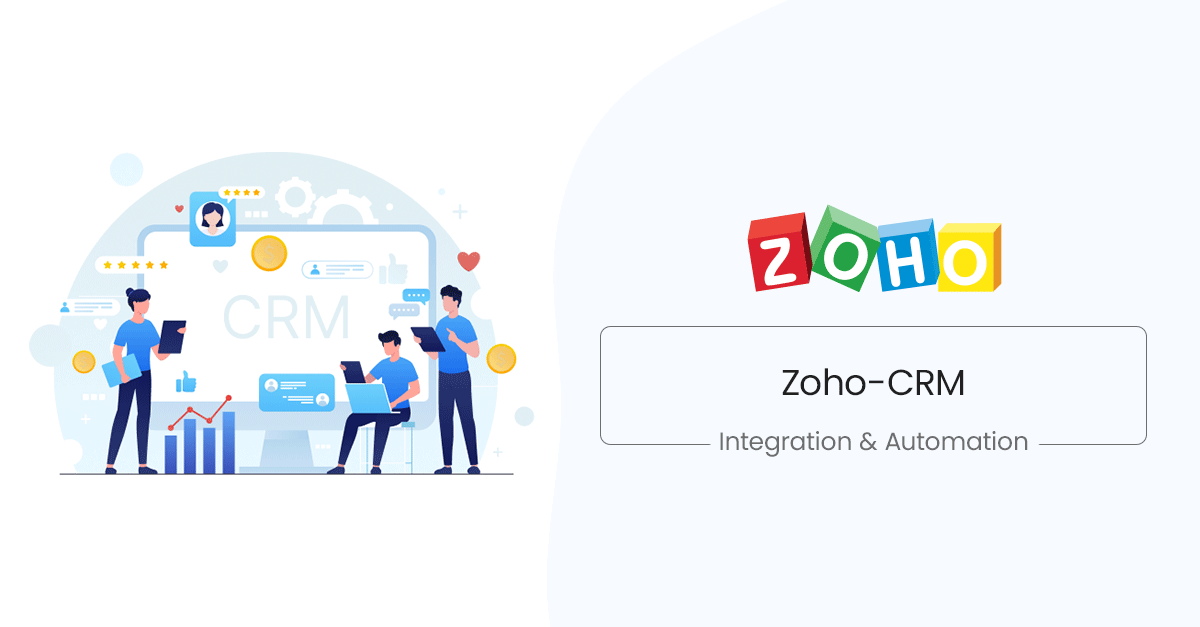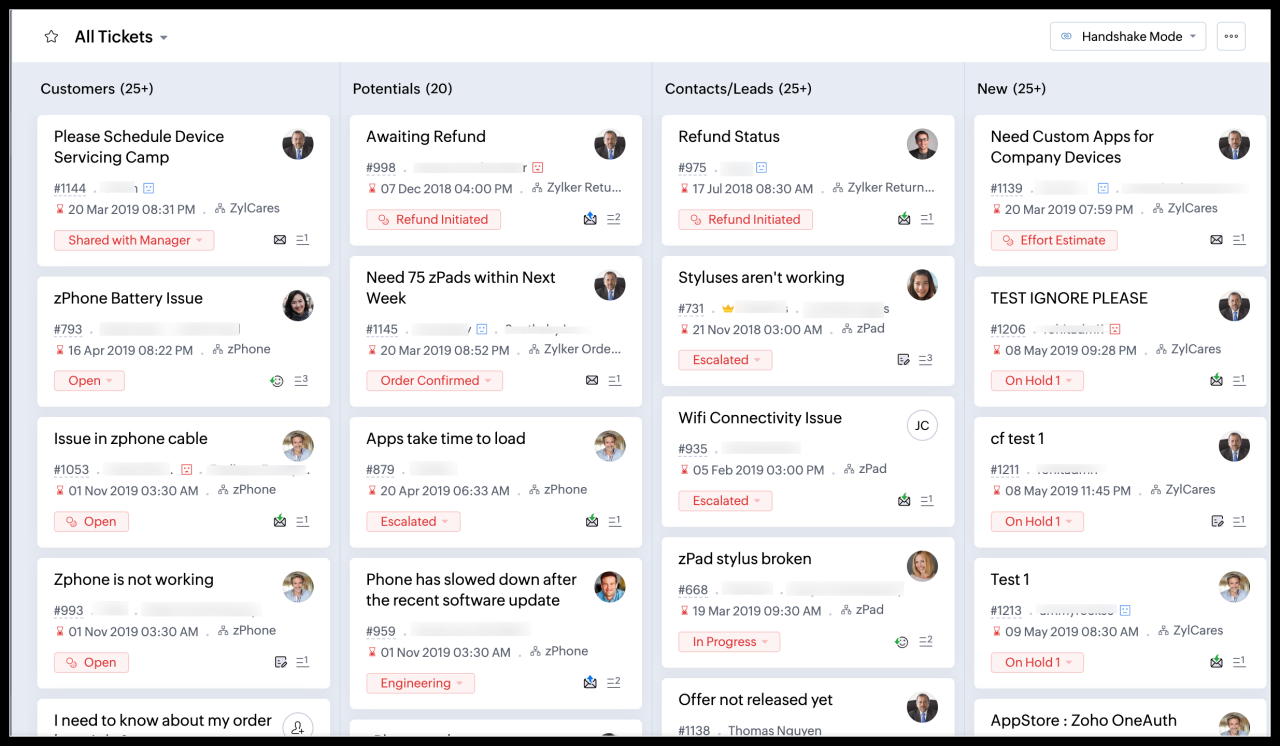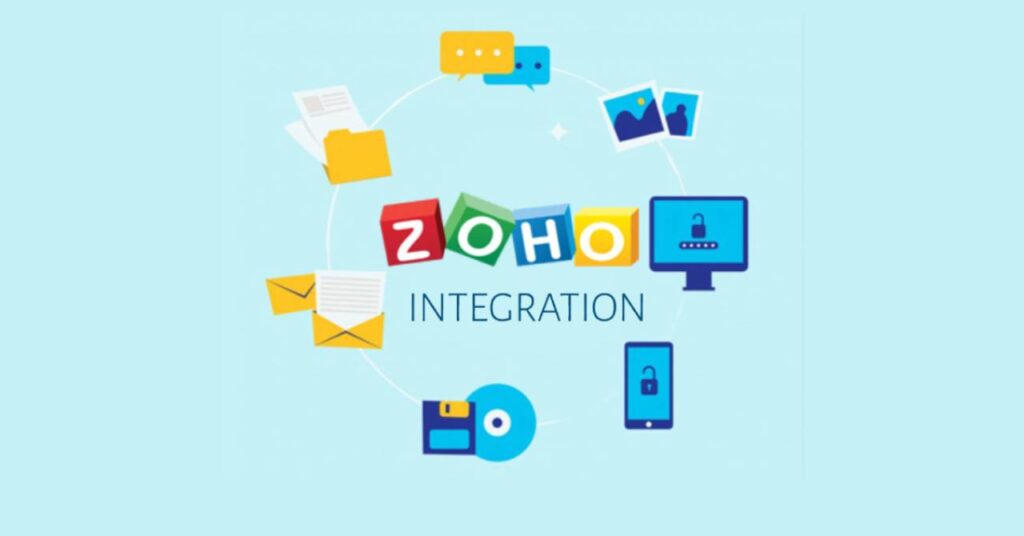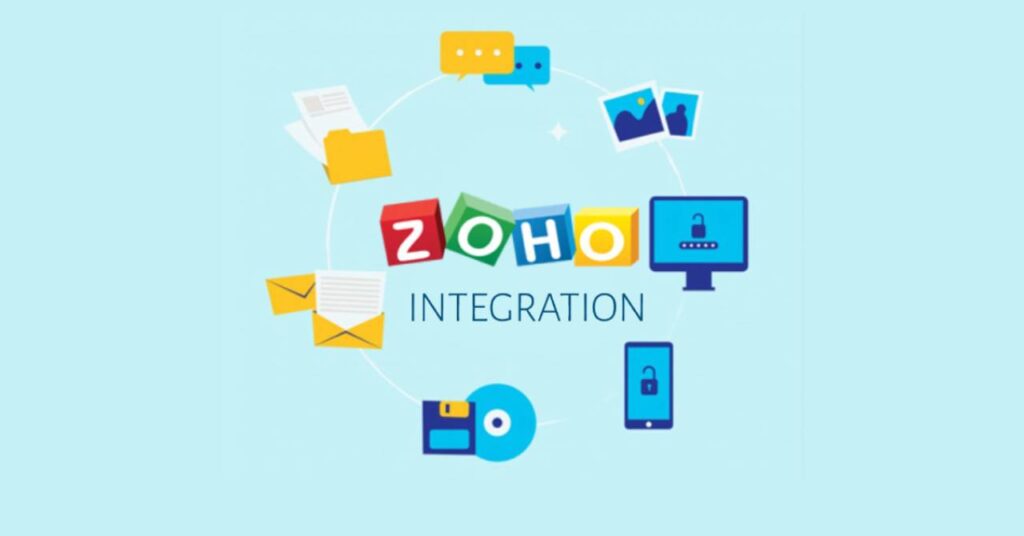Zoho CRM integration empowers businesses to seamlessly connect their CRM with other crucial systems, optimizing workflows and enhancing overall productivity. This integration allows for a more holistic view of customer interactions and data, facilitating better decision-making. From accounting software to marketing automation platforms, the possibilities are vast.
This guide delves into the intricacies of Zoho CRM integration, exploring various aspects, from choosing the right integration partner to troubleshooting common issues. We’ll also cover the key considerations for a successful implementation, including data security and compatibility concerns.
Introduction to Zoho CRM Integration
Zoho CRM integration allows businesses to seamlessly connect their CRM system with other applications, streamlining workflows and maximizing data utilization. This connectivity eliminates data silos, enabling a holistic view of customer interactions across different departments and platforms. By automating tasks and synchronizing information, organizations can boost efficiency and gain actionable insights for better decision-making.This integration enhances customer relationship management by providing a unified platform for managing various aspects of customer interactions, from sales and marketing to support and service.
This interconnected approach facilitates better customer understanding and allows businesses to tailor their strategies to individual customer needs, fostering stronger customer relationships.
Types of Zoho CRM Integrations
Zoho CRM offers a wide range of integrations to cater to diverse business needs. These integrations extend beyond basic functionalities and provide opportunities for enhanced automation and data analysis. Common integration types include:
- Accounting Software: Integrations with accounting software like QuickBooks or Xero allow for automated data transfer between CRM and financial records. This ensures accurate tracking of sales revenue, expenses, and customer payments. This synchronization provides a comprehensive view of the financial performance tied to customer interactions.
- Marketing Automation Tools: Integrating Zoho CRM with marketing automation platforms like HubSpot or Mailchimp enables a unified view of customer journeys and preferences. This allows for targeted campaigns, personalized communications, and optimized marketing strategies.
- E-commerce Platforms: Connecting Zoho CRM with e-commerce platforms like Shopify or WooCommerce facilitates seamless order management, inventory tracking, and customer relationship management. This unified view of sales data and customer interaction is crucial for optimizing e-commerce operations.
- Project Management Tools: Integrations with project management software like Asana or Trello can streamline project timelines and resource allocation. This enhances visibility into customer-related projects and allows for better project management.
Examples of Successful Zoho CRM Integrations
Several businesses have successfully leveraged Zoho CRM integrations to achieve significant improvements in efficiency and customer satisfaction. For example, a retail company integrated Zoho CRM with their e-commerce platform, allowing them to track online orders and customer interactions more efficiently. This streamlined process resulted in faster order fulfillment and improved customer service responses. Similarly, a real estate agency used Zoho CRM integration with an accounting software package to manage client payments and track commissions more effectively.
This streamlined process resulted in faster order fulfillment and improved customer service responses.
Benefits of Zoho CRM Integration
The following table Artikels the advantages of integrating Zoho CRM with other business systems:
| System | Benefits |
|---|---|
| Accounting Software | Improved financial reporting, automated invoicing, streamlined expense tracking, and accurate revenue recognition. |
| Marketing Automation Tools | Enhanced marketing campaign performance, improved lead nurturing, and personalized customer communication. |
| E-commerce Platforms | Streamlined order management, improved inventory tracking, and enhanced customer service response times. |
| Project Management Tools | Improved project visibility, enhanced resource allocation, and improved collaboration among teams. |
Key Considerations for Zoho CRM Integration

Choosing the right Zoho CRM integration partner and understanding the nuances of the process is crucial for a successful implementation. Careful planning and consideration of potential risks and compatibility issues can significantly impact the overall success and ROI of the integration. This section delves into key factors to consider before embarking on a Zoho CRM integration project.
Choosing a Zoho CRM Integration Partner
Selecting a reliable and experienced integration partner is paramount. Look for partners with proven expertise in Zoho CRM and a strong understanding of your specific business needs. Thorough research and due diligence are essential to ensure a seamless and effective integration process. Consider factors like their past projects, client testimonials, technical capabilities, and their understanding of your industry-specific requirements.
This diligence can help mitigate potential integration issues and ensure the partner possesses the necessary skills to manage any challenges that may arise.
Data Security and Privacy in Zoho CRM Integrations
Data security and privacy are paramount when integrating with Zoho CRM. Robust security measures should be in place to protect sensitive data from unauthorized access and breaches. The chosen integration partner should adhere to strict data security protocols and ensure compliance with relevant regulations, such as GDPR or CCPA. Data encryption, access controls, and regular security audits are critical elements to consider in this regard.
A comprehensive security policy should be in place to protect confidential information and maintain compliance with data privacy regulations.
Potential Risks Associated with Zoho CRM Integration
Integration projects, while potentially beneficial, carry inherent risks. Data migration issues, unforeseen technical challenges, and disruptions to existing workflows are potential obstacles. Proper planning, meticulous testing, and robust contingency plans can mitigate these risks. It’s crucial to thoroughly assess potential challenges and establish clear communication channels with the integration partner to address them proactively.
Potential Compatibility Issues Between Zoho CRM and Other Systems
Compatibility issues can arise when integrating Zoho CRM with other systems. Factors such as differing data formats, incompatible APIs, or system limitations can create challenges. Carefully evaluate the technical specifications of your existing systems and the Zoho CRM integration to identify potential conflicts. Conduct thorough testing to ensure seamless data exchange and avoid unexpected errors during the integration process.
A comprehensive compatibility assessment is vital to prevent unforeseen problems.
- Different Data Formats: Ensure that the data formats of the systems being integrated are compatible. Incompatibility can lead to data loss or corruption. Data transformation tools or processes may be necessary to resolve format discrepancies.
- API Limitations: Evaluate the APIs used by the systems to determine if they are compatible with each other. Limitations or incompatibilities in the APIs can lead to integration issues. Alternative methods for data exchange may be required.
- System Limitations: Analyze the limitations of each system to identify any potential issues that may arise during the integration process. Understanding system constraints can help in planning and problem-solving.
Comparison of Zoho CRM Integration Methods
Different integration methods offer varying advantages and disadvantages. Choosing the appropriate method depends on factors like your technical expertise, budget, and the complexity of the integration.
| Method | Pros | Cons |
|---|---|---|
| API | High level of customization, direct control, potentially faster data exchange | Requires technical expertise, can be complex to implement, potential for errors |
| Zapier | Ease of use, quicker setup, no coding required, good for basic integrations | Limited customization, potential for slower data exchange, fewer advanced features |
| Custom Integrations | Tailored solution, meets specific needs, maximum control | High cost, complex, requires specialized technical expertise |
Implementing Zoho CRM Integration
Implementing a Zoho CRM integration requires careful planning and execution. This process involves configuring the integration with the third-party application, ensuring data consistency, and thoroughly testing the system before deployment. Thorough understanding of both systems’ functionalities and limitations is critical to a successful integration.
Setting Up a Zoho CRM Integration
This involves configuring API keys, authentication methods, and mapping fields between Zoho CRM and the third-party application. A clear understanding of the data flow is essential. Properly defining the mapping rules ensures accurate data transfer and prevents errors. A critical step is setting up the data synchronization schedule.
Step-by-Step Integration Guide (Zoho CRM and e-commerce platform)
This detailed guide provides a structured approach for integrating Zoho CRM with an e-commerce platform, focusing on the specific steps.
- Identify Required Fields: Determine the customer data from the e-commerce platform that needs to be imported into Zoho CRM. Examples include customer name, email address, purchase history, and order details.
- Configure API Keys: Obtain API keys for both Zoho CRM and the e-commerce platform, ensuring proper access permissions. This step is crucial for secure data exchange.
- Map Fields: Create a mapping table that links fields from the e-commerce platform to corresponding fields in Zoho CRM. This mapping ensures data consistency and accuracy.
- Test Data Synchronization: Import a small sample of data to test the integration’s functionality. This helps identify potential errors before large-scale data migration.
- Automate Data Synchronization: Set up a scheduled synchronization process to ensure real-time updates between the systems. This is critical for maintaining data consistency.
- Monitor Integration Performance: Regularly monitor the integration’s performance to identify and resolve any issues promptly.
Importance of Thorough Testing
Thorough testing is crucial for identifying and resolving issues before deploying the integration to production. This includes testing with various data scenarios, including edge cases and error conditions. A robust testing phase minimizes the risk of data inconsistencies and system failures after deployment. This step is vital to maintaining the integrity and efficiency of the CRM.
Best Practices for Managing and Troubleshooting Integrations
Maintaining Zoho CRM integrations requires proactive management and troubleshooting strategies. Regular monitoring of data flow and system performance is vital. Documenting integration configurations, mapping rules, and error resolutions helps facilitate troubleshooting and maintenance. Developing clear escalation procedures for addressing integration problems is critical to ensure timely resolution.
- Regular Monitoring: Establish a schedule for monitoring data transfer and system performance to identify and address any issues quickly.
- Comprehensive Documentation: Maintain detailed documentation of all integration settings, mappings, and troubleshooting steps.
- Communication Protocols: Establish clear communication channels between teams involved in the integration.
- Backup and Recovery: Implement backup and recovery procedures to safeguard against data loss or system failures.
Common Integration Errors and Solutions
| Error | Solution |
|---|---|
| Incorrect field mapping | Review and correct the field mapping rules to ensure accurate data transfer. |
| Authentication issues | Verify API keys, authentication tokens, and permissions. |
| Data synchronization errors | Check for conflicts in data formats, ensure proper data types, and verify the synchronization schedule. |
| System performance issues | Optimize data transfer processes, adjust synchronization frequency, or investigate system resource constraints. |
| Unexpected error messages | Review error logs from both Zoho CRM and the third-party application to pinpoint the cause of the error. |
Zoho CRM Integration Use Cases
Zoho CRM integration offers numerous benefits across various business functions, significantly improving operational efficiency and data management. By connecting Zoho CRM with other systems, businesses can streamline workflows, automate tasks, and gain valuable insights from integrated data. This integration enhances overall productivity and decision-making capabilities.Integrating Zoho CRM empowers businesses to leverage a unified platform for all customer interactions, providing a comprehensive view of customer relationships.
This centralized view facilitates a more efficient and customer-centric approach to business operations.
Specific Use Cases for Enhanced Workflows
Zoho CRM integrations can streamline a wide range of business processes, impacting multiple departments. For instance, integrating with e-commerce platforms automatically updates customer information and order details within Zoho CRM, enabling a seamless transition between sales and order fulfillment. Similarly, connecting with marketing automation tools allows for targeted campaigns based on customer data stored in Zoho CRM, maximizing marketing effectiveness.
Examples of Workflow Improvement through Integration
A retail company integrating Zoho CRM with their point-of-sale (POS) system can automatically update customer profiles with purchase history, preferences, and order details. This real-time data synchronization enables personalized recommendations and targeted promotions, enhancing customer satisfaction and sales conversion rates. Another example includes a service-based business integrating with a project management tool, enabling seamless tracking of customer interactions, project milestones, and task completion.
This facilitates improved project management, customer relationship tracking, and ultimately, increased profitability.
Automation of Business Processes
Zoho CRM integration automates various tasks, freeing up employees for more strategic activities. By integrating with accounting software, businesses can automatically record sales, update financial records, and generate invoices, eliminating manual data entry and reducing errors. Similarly, integration with email marketing platforms enables automated follow-up sequences, personalized email campaigns, and automated responses to customer inquiries. These automated workflows enhance operational efficiency and employee productivity.
Enhancing Data Analysis Capabilities
Zoho CRM integration expands the scope of data analysis, enabling businesses to gain deeper insights into customer behavior and market trends. By integrating with data warehousing solutions, businesses can create comprehensive dashboards for visualizing sales trends, customer segmentation, and marketing campaign performance. This allows for better informed decision-making, more accurate forecasting, and improved marketing strategies. Data analysis can also be enhanced by integrating with business intelligence tools, enabling businesses to generate comprehensive reports, identify patterns, and track key performance indicators (KPIs).
Comparison of Integration Solutions for Different Business Needs
| Need | Solution | Pros | Cons |
|---|---|---|---|
| Sales Force Automation | Integration with CRM | Improved lead management, enhanced sales forecasting, automated sales processes | Requires careful configuration and potentially high implementation costs |
| Marketing Automation | Integration with Marketing Automation tools | Targeted marketing campaigns, improved customer segmentation, enhanced customer engagement | Requires specific marketing expertise and a detailed understanding of campaign management |
| Order Fulfillment | Integration with e-commerce platforms/Inventory Management systems | Real-time order updates, improved order processing, seamless customer service | Potentially complex setup, requires strong technical support, and potentially high cost |
Zoho CRM Integration Tools and Platforms

Zoho CRM, a powerful platform, benefits greatly from seamless integration with other applications. This integration streamlines workflows, automates tasks, and enhances overall productivity. Choosing the right integration tools is crucial for maximizing the value of Zoho CRM. Effective integration tools connect various business systems, facilitating data exchange and improving operational efficiency.Integration platforms act as intermediaries, connecting Zoho CRM with other software applications.
They automate data transfer, enabling businesses to avoid manual processes and reduce errors. These tools offer various functionalities, including data mapping, scheduling, and error handling, which significantly impact the reliability and efficiency of the integration process.
Popular Integration Tools
Numerous tools facilitate Zoho CRM integration, each offering unique features and functionalities. These tools span a range of capabilities, allowing businesses to choose solutions tailored to their specific needs. Popular options include Zapier, Make, Integromat, and others. These tools are widely used and offer comprehensive capabilities for automating processes and streamlining workflows.
Zapier
Zapier is a leading automation platform that facilitates connections between various applications. It offers a wide range of pre-built integrations and allows users to create custom integrations using its visual interface. Its drag-and-drop interface makes it user-friendly, even for those with limited technical expertise. Zapier allows for automated data transfer, enabling businesses to sync data between Zoho CRM and other applications.
A key strength of Zapier is its ease of use, making it accessible to a broader range of users.
Make
Make is another popular integration platform that connects various applications and services. It offers a visual interface for creating workflows and automating tasks. This platform enables users to build complex integrations using pre-built templates and custom logic. The user-friendly interface and broad range of features make it a viable choice for businesses needing robust integration capabilities. One important feature is its ability to customize actions based on specific conditions.
Integromat
Integromat is a comprehensive integration platform that allows users to connect various applications. Its strong feature set includes complex automation and advanced trigger options. Integromat offers a visual interface for designing integrations, making it accessible to a wide range of users. It supports various triggers and actions, enabling users to create sophisticated workflows. Its advanced capabilities often appeal to businesses requiring more complex integrations.
Comparison of Integration Platforms
| Tool | Pros | Cons ||—|—|—|| Zapier | User-friendly interface, extensive pre-built integrations, affordable pricing | Limited customizability, potentially slower for complex workflows || Make | Intuitive interface, robust features, diverse integrations | May have a steeper learning curve for complex setups || Integromat | Powerful automation capabilities, advanced triggers, flexibility | More complex setup, potentially higher pricing |
Illustrative Examples
Using Zapier, a business can automatically create a new contact in Zoho CRM when a new lead is captured on a website form. This automates lead management and ensures that all leads are tracked efficiently. Make can integrate social media data with Zoho CRM, enabling businesses to track customer engagement across various platforms. This allows for a more holistic view of customer interaction.
Integromat can create complex workflows involving multiple applications, like transferring data from an e-commerce platform to Zoho CRM and triggering specific actions based on order status. These examples highlight how these tools streamline workflows, reducing manual effort and improving accuracy.
Future Trends in Zoho CRM Integration

Zoho CRM’s integration capabilities are constantly evolving, driven by the demands of modern businesses and the emergence of innovative technologies. This evolution promises to enhance the user experience and streamline workflows, ultimately leading to more efficient and effective CRM management. Anticipating these future trends is crucial for businesses looking to maximize the value of their Zoho CRM investments.
Predictive Analytics Integration
Predictive analytics is rapidly becoming a cornerstone of modern business decision-making. Integrating this capability directly into Zoho CRM will allow users to leverage powerful algorithms for tasks such as lead scoring, churn prediction, and sales forecasting. This will empower sales teams to prioritize high-potential leads, anticipate customer needs, and proactively address potential issues, all within the familiar Zoho CRM interface.
The integration of predictive models into Zoho CRM will significantly enhance the accuracy and effectiveness of sales strategies, ultimately driving revenue growth.
AI-Powered Automation
Artificial intelligence (AI) is poised to play a more significant role in automating CRM tasks. Future Zoho CRM integrations will likely feature AI-driven tools that can automate routine activities like data entry, email responses, and appointment scheduling. This will free up sales and marketing personnel to focus on more strategic activities, leading to improved productivity and efficiency. For instance, AI-powered chatbots can provide instant support to customers, answer common queries, and guide them through the sales process, reducing the workload on customer service representatives.
Enhanced Mobile Integration
The increasing reliance on mobile devices necessitates more robust mobile integration within Zoho CRM. Future iterations of Zoho CRM will likely offer even more comprehensive mobile capabilities, allowing users to access and manage their CRM data on the go. Real-time data updates, seamless mobile workflows, and enhanced offline access will be critical for maintaining productivity in dynamic work environments.
This trend is exemplified by the growing popularity of mobile-first CRM solutions, which emphasize the ability to manage and access CRM data from anywhere at any time.
Integration with Emerging Technologies
The future of Zoho CRM integration extends beyond traditional technologies. Expect integrations with emerging technologies such as blockchain, the Internet of Things (IoT), and augmented reality (AR). Blockchain integration can enhance data security and transparency in customer interactions. IoT integration can allow for real-time tracking of customer interactions and preferences, providing a richer understanding of their needs.
AR integration can create interactive experiences that enhance the customer journey and provide valuable insights to sales representatives. The successful integration of these technologies will transform the way businesses interact with customers and manage their relationships.
Impact on Existing Integrations
The emergence of these new integration technologies will influence and potentially reshape existing Zoho CRM integrations. The future will likely see a shift towards more sophisticated and interconnected systems, leveraging the capabilities of these emerging technologies to create a seamless and holistic customer experience. This trend is observed in many industries where businesses are adopting more sophisticated and interconnected systems.
As a result, existing integrations will likely need to be updated or enhanced to maintain compatibility and functionality.
Last Point
In conclusion, Zoho CRM integration offers a powerful solution for businesses seeking to streamline their operations and maximize the value of their CRM. By carefully considering the various integration options, partners, and potential risks, organizations can unlock the full potential of their Zoho CRM system and achieve significant improvements in efficiency and data analysis. Future trends in integration technology are also discussed, providing insight into the evolving landscape.
Clarifying Questions
What are some common integration methods for Zoho CRM?
Common methods include using APIs, Zapier, and custom integrations, each with its own advantages and disadvantages. The best method depends on the specific needs and technical capabilities of the organization.
What are some potential compatibility issues with Zoho CRM?
Compatibility issues can arise due to differences in data formats, API structures, or system architectures. Thorough testing and careful consideration of the chosen integration method are essential.
How can I ensure data security during Zoho CRM integration?
Robust security protocols are crucial. Choose integration partners with strong security measures and adhere to industry best practices for data encryption and access controls. Prioritize data privacy throughout the process.
What are some typical errors encountered during integration, and how are they resolved?
Common errors include misconfigurations, authentication failures, and data format discrepancies. Solutions often involve reviewing the integration setup, verifying API keys, and correcting data mappings. Detailed troubleshooting guides are valuable.






